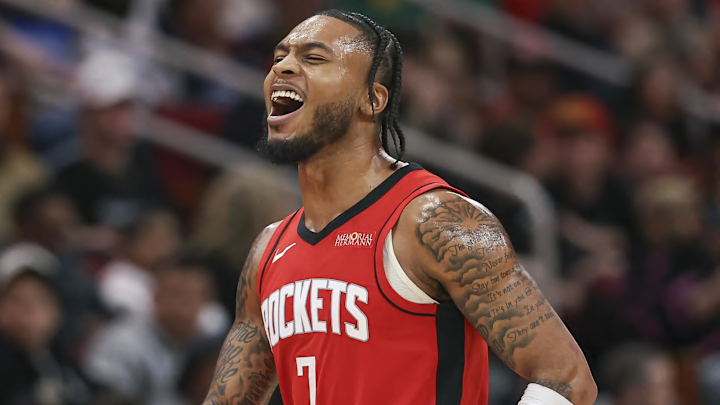By trading Cam Whitmore to the Washington Wizards, the Houston Rockets aren't just tightening their rotation. They are admitting what they and, frankly, the rest of us knew all along: They can neither play nor pay everyone for much longer.
According to ESPN’s Shams Charania, Houston is shipping the 20-year-old off to Washington in exchange for two second-round picks. The return is quite low relative to the pomp and promise Whitmore displayed at times with the Rockets. Even after an uneven performance during the 2024-25 campaign, selecting him at No. 20 in the 2023 draft is considered a borderline steal.
Still, Houston did not have a ton of leverage. This team became so good and so deep, so quickly, that its timeline is getting fast-tracked.
The acceleration started with posting the Western Conference’s second-best record last season, on the back of a terrifyingly effective defense, and pushing the Golden State Warriors to seven games in the first round. It spilled over into the Kevin Durant trade, and then the signing of Dorian Finney-Smith. And now, the Rockets’ trajectory is continuing to speed up with the departure of Whitmore—the player who epitomizes all of the challenges and tough choices they must make moving forward.
The Rockets no longer have room for Cam Whitmore
Whitmore became collateral damage of the Rockets’ meteoric rise long before getting traded. His minutes actually declined from his rookie season this past year, and they dipped even further after the All-Star break.
The streaky wing didn’t do himself any favors. His offensive energy is like a jolt of adrenaline. At his best, he can obliterate defenses in transition, provide some on-ball thrust in the half-court, and get teed-up for triples. But he seldom maintained his peak for extended stretches, and despite clear every-level scoring upside, he is shooting under 60 percent at the rim and notching a below-average clip from three for his career.
Righting the ship was only going to get harder entering his third season. Durant, Finney-Smith, Amen Thompson, and Tari Eason would all be ahead of him in the rotation. The Rockets don’t even have the wiggle room to chisel out more court time for him by running small. They are clearly favoring an entirely different look with a frontcourt populated by Alperen Sengun, Jabari Smith Jr., Steven Adams, and Clint Capela.
Houston is about to get expensive
Even if Whitmore is someone the Rockets see as a breakout candidate, his fate was already sealed.
Talent retention gets expensive when you have so much of it. And Houston has tons. Sengun is starting a five-year, $185 million extension next season. The Rockets lopped off Jalen Green’s money (three years, $105.3 million), but replaced him with Durant, who could sign a two-year extension worth as much as $122 million or $124 million.
Smith, meanwhile, just put pen to paper on a five-year, $122 million extension that may age into a bargain but still projects to eat up between 12 and 13 percent of the salary cap. Eason is extension-eligible himself right now. Thompson will be up for one next summer. Reed Sheppard, if he pans out, will follow suit during the 2027 offseason.
All of these decisions are and will continue to add up. Even as players like Durant and Fred VanVleet age out, the Rockets are going to be expensive. That’s the opportunity cost of drafting and trading so darn well. It is a great problem to have, but it’s a problem all the same—one that not only expedited Whitmore’s departure, but is bound to come at the expense of others currently on the roster.
